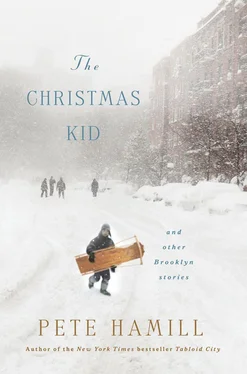“They both stink,” Gerry Grogan said. “You gotta go in that locker room and take off all your clothes and—”
“I’ll go with you, Gerry,” Duke said.
“And then they have that key on that gray elastic band, with who knows what kind of diseases in it, and there’s too many people and all those jerks from down the Hill, they’re always throwing you in the water. Nah…”
Betty Gahan said, “He just wants to watch bathing suits come off, the slob.”
“I just want to see some new faces,” Duke said. “Every week it’s the same old faces.”
“You could get polio at Sunset Park, Duke,” Gerry Grogan said. “It spreads in the water. Even Roosevelt got it swimming.”
“In Sunset Pool?” Duke shouted.
Gerry punched Duke on the arm, and he backed away, laughing, and she said, “Duke, you get it in swimming pools. From all the degenerates like you that go there and swim.”
Then Hansen said, “You worry too much, Gerry. You always think something’s going to go wrong.”
She looked at him and laughed. “It usually does.”
Then Betty Gahan said, “Well, let’s talk about it down at the Caton.”
That’s how we decided to go to the Caton Inn. There were about fifteen of us, crowded together in the cigarette smoke at the far end of the horseshoe bar. We started a dollar pool. Everybody drank beer, except Harry Hansen. On TV, Joe Miceli was boxing a muscle-bound black guy while Don Dunphy sold Gillette Blue Blades. Tony Bennett was singing “I Won’t Cry Anymore” on the jukebox, and the place was filling up. That summer I was in love with a girl who didn’t love me back, so I was alone, and this made Gerry Grogan uneasy. She thought every girl should have a guy, and vice versa. She also thought that everybody should get married as soon as possible, and she was determined to be the first one in our crowd to do so. And Harry Hansen was the man. I asked her if he was going swimming with us the next day.
“I hate that Sunset Pool,” she said, and I agreed. “But that horny pervert Duke has everybody hot to go.”
“So go to Ocean Tide with Harry.”
She turned and watched Harry make his way through the crowd to the men’s room. “Let me ask you something: How come the guys don’t like Harry?”
“It’s not that the guys don’t like Harry,” I said. “I think it’s Harry don’t like the guys.”
“Jeez, I never thought of that.”
Harry came back and Gerry sipped her beer. Pérez Prado’s “Mambo No. 5” was blaring. Harry said, “You know I don’t dance.” And she turned to me. I looked at Harry, and he nodded okay, and Gerry and I pushed through the crowd to the dance floor in the back room. She danced furiously, amazingly, never losing the rhythm or the beat, but weaving a dozen complicated variations in and out of the basic steps. She made me feel as if I had a fire hydrant in each shoe.
Then the tune ended, and she laughed, and glanced out toward the bar, and then Tommy Edwards began to sing “It’s All in the Game.”
“Oh, I love this,” she said, and took my hand again, and we began to dance slowly, the floor filling with other dancers. “Why do you think he doesn’t like you guys?” she said. And I mumbled something about how hard it was to be an outsider around our crowd, how we had our own jokes and words and how we’d been together since grammar school. “Jeez, that could be trouble, couldn’t it?” she said. But I never answered. I saw Harry Hansen under the arch that separated the dance floor from the bar. He looked bitterly angry. Gerry saw him, too.
“I better go,” she said. “I’ll see you down Sunset.”
With that, she walked to Hansen, who said something I couldn’t hear, turned away, and started for the door with Gerry behind him. I went back to the crowd. Miceli had flattened his opponent in seven rounds. Left hook, of course. Vito wanted to know if I was trying to break up the Mutt and Jeff Bandit Team. Duke was complaining to Betty Gahan that all the Irish girls he knew were plainclothes nuns. Billy and Tim arrived from somewhere. The beer flowed. The smoke thickened. I danced with a dark-haired girl from Flatbush and went off with her into the night.
When I woke up, it was almost noon. I ate breakfast quickly and went up to the totes, but there was nobody around. I saw Colt, the cop, and asked him where everybody was. “The bums all went out to Sunset,” he said. “To swim with the other bums.” I went into the Sanders and sat in the cool Saturday afternoon darkness and watched The Caine Mutiny and then went home and took a nap. When I came back to the totes that night, everybody was sunburned. Gerry Grogan was not around.
“She isn’t feeling too good,” Betty Gahan said.
“Sound like a bad case of Harry.”
“No,” Betty said. “She really doesn’t feel good.”
By Tuesday, we knew that Gerry Grogan had polio. Of course. The news raced through the neighborhood, and it’s difficult to explain now what the word “polio” could do to people in those days. The fear, the horror. Just the word. Polio. At the hospital, they wouldn’t let us see her for a while, and her family seemed confused, as if possibly ashamed that this had happened to one of them. We sent flowers. We wrote notes. But I didn’t get to see Gerry Grogan until the following Saturday afternoon. When I walked into the ward, she was alone in a bed against the far wall. She turned and saw me and started to cry. I tried to console her, feeling stupid and clumsy. But then I learned why she was crying. Harry Hansen had not come to visit her. Not even once.
“The son of a bitch, at least he could come and say good-bye,” she said. “That’s all I want. A good goddamned good-bye.”
She never saw Harry Hansen again. But one chill night in autumn, after Gerry Grogan had left the hospital, and after we had thrown her a welcome-home party, and after she’d begun the exercises for her ruined legs, Colt, the cop, walked over to us at the totem poles. He wanted to know if we knew a Harry Hansen. Tall, red-haired, Colt said. He was in the Lutheran Hospital in Bay Ridge with both of his legs broken. No, nobody ever heard of him.
“He’s not from around here,” Duke said. And after Colt left, we went to pick up Gerry Grogan to take her down to the Caton Inn.
THE BOY WAS COMING home from Coney Island one summer evening when he saw lights burning in the empty store. The store was across the street from the Minerva Theatre, where the gang called the Tigers lolled through all seasons in their zoot suits and pegged pants. The store had been empty all winter. Now the door was open, and the boy could see a one-armed man and an old Italian carpenter hammering away.
They were building a large slanted structure that filled the store, and the one-armed man held nails in his mouth, forced them into wood with his hand, then flipped a hammer that was tucked under his elbow and drove the nails into the wood. The boy, who was then twelve, watched this for a while, and then went home to climb into the bunk bed with his Brooklyn dreams.
The next day, the framework was covered with great sheets of plywood, and Seamus Grady, the one-armed man, was in business. He was a sign painter, and on the slanted plywood drawing table there were now large rolls of paper. Sheets of poster board were stacked on shelves under the tables, and a taboret was thick with jars of paint, cans of water, brushes of all shapes and sizes. The man worked with precision and delicacy, making signs for butcher shops and toy stores, bars and dry cleaners. Things for sale. Prices. The boy felt an odd excitement, watching the first artist he had ever seen.
A week later, while the Tigers were singing songs across the street, he saw that the shop window was now filled with some amazing things: large blown-up photostats, mounted on cardboard, of comic strips. Flash Gordon, Prince Valiant . And, most astonishing of all: Terry and the Pirates, the comic strip he loved more than any other. It was drawn by Milton Caniff, who the year before had given it up to begin Steve Canyon . Tentative, afraid, as if crossing this threshold might change his life, the boy walked into the studio of Seamus Grady.
Читать дальше












